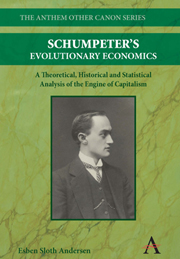 Schumpeter's Evolutionary Economics
Schumpeter's Evolutionary Economics Book contents
Summary
When the Austrian-American economist Joseph A. Schumpeter died in 1950, he had received many forms of recognition. He was Professor of Economics at the famous Harvard University in the USA; he was the most cited scholar in the whole field of economics (Samuelson, 1981a, 1); he had recently served as the President of the American Economic Association and had just been elected to become the first President of International Economic Association. This exceptional status was based on Schumpeter's contributions to all major parts of economics and to other social sciences, his all-encompassing network of scholarly contacts, and his ardent support for the new generation of ambitious economists. However, as pointed out by Paul Samuelson, Schumpeter was not satisfied with the status he received. According to Samuelson, who considered himself to have been both Schumpeter's friend and pupil, he was sceptical about his “Popeship” because this was not what he had strived for. From his youth, Schumpeter's main ambition had been to become one of the great economists, and he thought that such economists are not orthodox Popes, but radical scientific innovators. Since he did not succeed in his attempt to renew the science of economics, Samuelson (1981a, 1) suggested that Schumpeter “would have traded his Popeship for a Keynesian revolution”. This does not mean that Schumpeter would have liked to promote an arbitrary scientific revolution. Instead, he wanted to trade his position within the economic establishment for an evolutionary-economic breakthrough, which he had tried to obtain throughout his academic life.
- Type
- Chapter
- Information
- Schumpeter's Evolutionary EconomicsA Theoretical, Historical and Statistical Analysis of the Engine of Capitalism, pp. 1 - 20Publisher: Anthem PressPrint publication year: 2009
- 1
- Cited by


